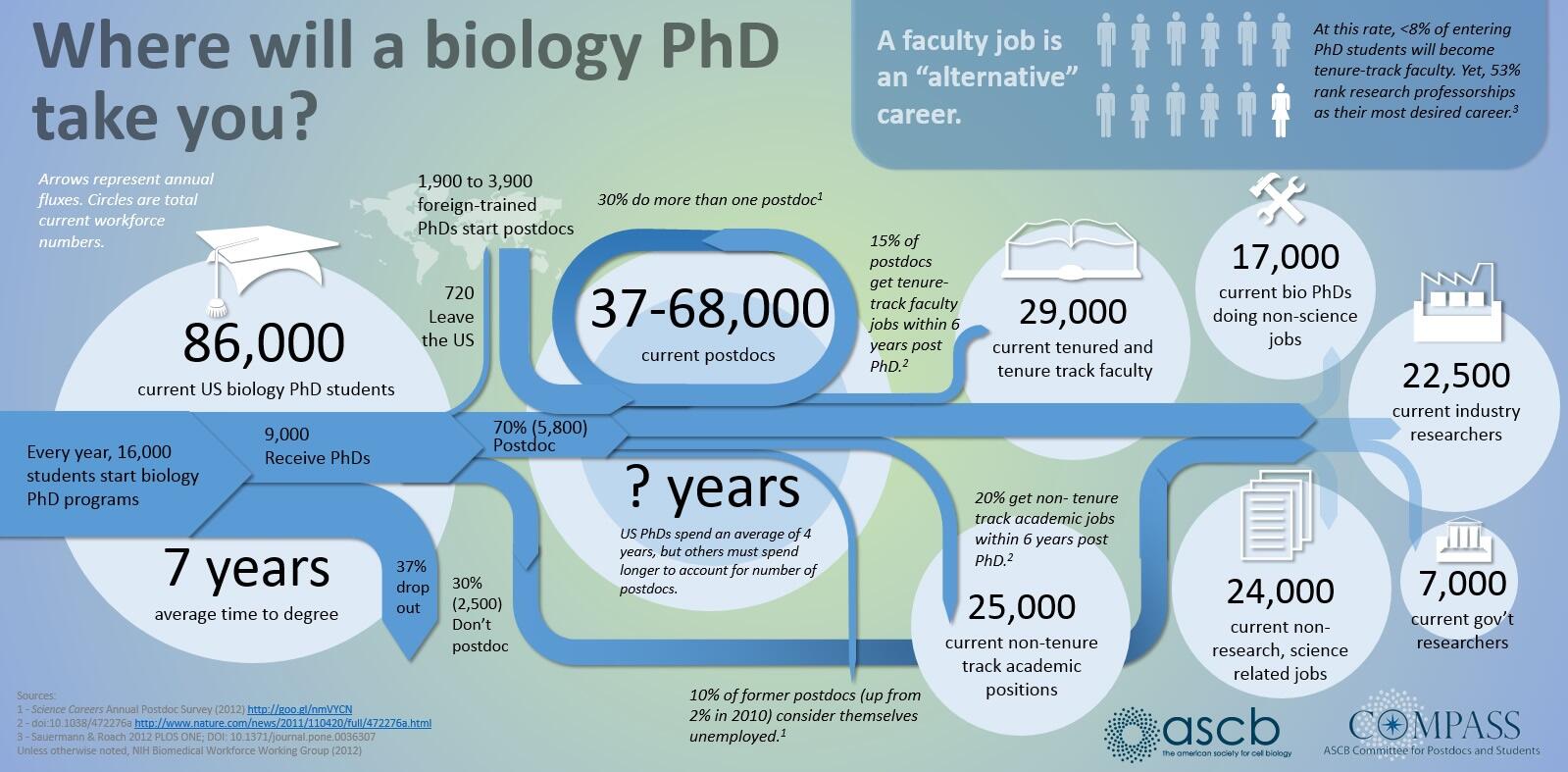When you’re just starting or nearing the end of your college career, you are either feeling prepared for the adult world ahead, or you still feel lost about what are the next steps in your professional career. If you’re reading this, I’m guessing you might fall in the latter, and I’m sure you might have questions regarding the many paths you can take in this biotech industry. For some jobs, the road to success is a clear one, but for the biotech industry, it could be a lot harder to decide what direction to take due to the many options that are laid out for you. For this blog post, I wanted to provide a one-stop guide answering FAQs that I gathered from graduates going through the same struggles as you are.
To Ph.D. or not to Ph.D.?
This is a common question that I came across during my research, but I believe the answer mostly depends on your personal preference and where you see yourself taking part in this growing industry. If you’re set on going for it, this means you see yourself in working as a teacher in high-end university or conducting research that you deeply care about.
But even if you feel mentally prepared on getting a Ph.D., it is still no easy task even for the most determined individual.
This is a four to seven-year commitment that you have to take, and it can even go for longer depending on your specialization. While it will be a very intellectually gratifying experience, writing your dissertation and conducting the daily research will be mentally challenging and sometimes even isolating.
As with any important life decision, take some time to reflect and ask questions to yourself. This article on LinkedIn by Christopher Laincz, director of the Ph.D. program at LeBow College, outlined 10 crucial questions you must ask yourself before going forward with this daunting task:
- Do you love research?
- Are you prepared to make academic research your career?
- Will you be comfortable living on a small stipend?
- Do you know which faculty’s research agendas fit your research interests?
- Are you prepared to quit your job and go full-time for the next 5+ years
- Have you spoken with multiple people with a Ph.D. in your desired field about their experiences?
- Can you take constructive criticism well?
- Do you have the necessary skills? Do you know what they are?
- Are you mainly looking to improve your business skill set or raise your credentials?
- Do you have realistic expectations regarding your chances of admittance?
I would suggest digging deeper into this article, as it can provide you with links to other posts focused on helping graduates like yourself going through the same doubts.
Below is an info-graphic from American Society for Cell Biology and their committee for postdocs and students, which outlines the different potential paths you could have if you decide to go for a Ph.D.-
The Job Search:
The dreaded job search can be a roller-coaster for some people and a smooth ride for others. It depends on where you put your priorities when trying to get your foot in the door. For example, when I was applying for jobs, I put way too much focus on making my resume and CV look perfect. While this is important, I should have focused more on networking with the right people instead.
The reality is that around 85% of people are hired just through networking alone, beating the usual method of applying directly online 3:1. The reason why is because companies would rather save money and time by recruiting internally, especially since doing so is also a lot less risky. However, if you can gain the trust of an employee, your referral could be enough to put you ahead of the competition.
A great place to start would be messaging an alumnus on LinkedIn that is working in your company or area of interest. Once you find someone willing to help you out, make sure to have these four tips in mind:
- Ask them about their day-to-day and what skills the company looks for in a candidate, as it will give you a proper perspective on what necessary skills you might be lacking.
- Once you find someone willing to give you a hand, make sure you keep that interest alive by keeping them updated with your work or, if you feel comfortable, inviting them for a cup a coffee where you can both have a more personal talk with each other.
- Make sure to have an elevator pitch in mind when networking. I personally like to let the conversation go on naturally, but I always have a list of skills and past experiences in mind before going.
- Think of something about yourself that will differentiate you from other people in the company. For example, "I play the harpsichord" or "I'm a competitive gamer." It might seem awkward, but remember, people are always looking for something different that sets you apart from the rest of the applicants, and it doesn't have to necessarily be academic achievements. Maybe you both end up sharing similar interests, showing something about yourself that tells the interviewer, "yes, this is who I want to work with."
Besides networking through social media, attending career fairs or conferences around your city or university is also a must when trying to get your name out there. The New York Academy of Sciences has a great article on their website outlining some important information to keep in mind when attending a scientific conference.
Lastly, do a double check on your social media for any posts or photos that might tarnish your image and credibility. Keep in mind that some companies do in fact check your background before going forward with a hire, so make sure those embarrassing pictures of your wild college years are made private for just your friends.

Paths To Take:
Industry Research & Development
Getting into the research sector is probably the most straightforward choice for many grads coming out of college right now. This is the type of path you would want to take if you have a deep interest in conducting studies that can push our understanding of scientific principles or medical treatments. Your daily activities will be focused on conducting experiments and testing out hypothesis for your research project, recording the results, and later presenting them to the senior staff, clients or even other professionals. As you can imagine, getting into this path requires an amazing academic background, meaning that if you’re set on taking this path, a Ph.D. in the area of biology, biotechnology, biomedical sciences or chemistry is a must. However, be aware that a good part of your time will be revising and tweaking the samples you have developed to make sure it’s ready for mass production, which can take up to months at a time.
Academia
A friend once told me an interesting quote from his Ph.D. mentor: “Being in academia, you have to accept that the lifelong contributions you make to the field is probably comparable to a fart in a tornado.” As funny as that may be, it shouldn’t discourage you from perusing a career in the academic sector. Ask yourself next time you start your lab courses if you genuinely see yourself in 5 years being part of that environment. This is something I should’ve asked myself before signing up to lab courses because, although I was very interested in the subject and wanted to take part in new discoveries, I never got any enjoyment from the tasks we had to do nor the wait times that come with it.
If like me, you still have a love for biology but find it hard to get invested in lab work, maybe taking the academic route isn’t the right fit for you. But don’t let that discourage you, since there are other paths less traveled in this industry that can be the perfect fit you were looking for.
Marketing
The biology sector is a very niche one, which is why you don’t see ads promoting ELISA kits or custom antibody services on your day-to-day commute or web browsing. As you can imagine, people with a background in biology with an interest in other area areas – especially sales & marketing – are rare, which is why the need for people with these interest are growing. If you see yourself as more of a creative type, becoming part of this little corner can also be an advantage, as it is easier to make waves in this industry with a great campaign than it would in the more commercial sector of the market.
Here are some of the positions you might find yourself in if you feel like being in the marketing side is more your strong suit:
- Marketing Manager
- Product Marketing Specialist
- Marketing Coordinators
If you decided to pursue this path, most of your time will be spent developing a variety of content such as writing blog posts like this one, designing posters and backdrops for events, producing video content, and proposing engaging ideas to use for events or posting on social to increase customer interaction and brand awareness.
Hope the information in the article proved useful for you, and I wish you the very best in your future endeavors in the field of Biology!
If you want to get a head start, why not check out the jobs available here at ABclonal? We could have a position that is right for you!






